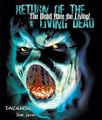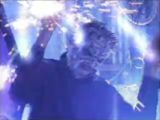The Dead Hate the Living!
Death and sleaze by index
Death by: 1 [~49:00]: zombie, decapitation, axe (insurance); 2 [~53:30]: zombie, decapitation; 3 [~1:22:00]: zombie, throat ripped out. Sleaze by: 1 [~05:50]: man, man thong; 2 [~06:00]: sex (unfulfilled).
Death and sleaze by notes
| Indexed | Time | Notes |
|---|---|---|
| ~01:00 |
Death by zombie. The first death fails one of the initial ground rules for the Film Death and Sleaze Index: all deaths must be final. If the deceased is seen later in the film reanimated as zombie, as this victim is, their death wasn't permanent and, thus, isn't indexable. | |
| ~04:30 |
Death by zombie, scalpel, throat cut. This is a scene from the film within a film and again violates the "Deaths are final" ruling. Yes, even if a character plays a character who meets their demise in a film's film, you're still not really dead. We're aiming to index "real" deaths, not impermanent simulations. | |
| ~05:50 |
Sleaze by man, man thong. Unlike deaths, it's hard to "fake" sleaze. Even though we're still in the film within a film, a near-naked man with a bulge in his thong is valid. The fact that we're indexing male sleaze is telling: sleaze doesn't have to arouse the watcher, it merely needs perceivable intent. David DeCoteau films (THE BROTHERHOOD, 1313) do nothing for me, but they're clearly beefcaking and, thus, indexable. | |
| ~06:00 |
Sleaze by sex (unfulfilled). "Unfulfilled" is generally used when a piece of sleaze doesn't "pay out". Sex with an ill-timed interruption or cut, or a shower or striptease without nudity are some common examples. Even though we're seeing two zombies getting frisky, they're still acting in the film within a film, so "sleaze by necrophilia" doesn't apply. | |
| ~45:00 |
Death by zombie. Victim is later seen reanimated as a zombie. Violates "Deaths must be final." | |
| ~49:00 |
Death by zombie, decapitation, axe (insurance). "Insurance" details "after death" inflictions; here, the headless body is used as a shield against an axe thrown by another zombie. | |
| ~53:30 |
Death by zombie, decapitation. | |
| ~59:00 |
Death by zombie (offscreen). Victim is later seen reanimated as a zombie. Violates "Deaths must be final." | |
| ~1:03:00 |
Death by head trauma, hand through head. I spent a healthy amount of time debating "hand" vs. "fist", even though this death is clearly a fist. I ultimately decided there should be parity between "hand through chest" (think a clawed impact with fingers curled on the other side) and that the likelihood of someone wanting to distinguish hand vs. fist was low. I also how like how "hand" removes the emotion inherent in "fist" - we are, after all, trying to be objective (just as we record sleaze that does nothing for the indexer). | |
| ~1:05:00 |
Death by zombie, hand through chest. Victim is later seen reanimated as a zombie. Violates "Deaths must be final." | |
| ~1:05:00 |
Indeterminate massacre. Maybe. Zombie lore suggests damage to the head only and we can't see any such head trauma to these combatants. Fast-moving, "endless hordes" style scenes are always impossible to accurately judge, so we usually only index the most obvious of deaths. There are none here. | |
| ~1:19:00 |
Death by TV, electrocution. | |
| ~1:22:00 |
Death by zombie, throat ripped out. The victim is seen again, still dying, at 1:23:30. Detailing death and sleaze is not only about what you see on screen, but also the intent that a non-existent budget or an "all in your mind!" mentality might not afford. When you see a zombie lunging for a character and then a quick cut, you can assume it was "death by zombie (offscreen)". Similarly, if there's a giant piece of your neck missing and you're admonishing your friends to leave you behind, you believe, as we must, that you're going to die. |
Image gallery
Automatically generated and alphabetized; expect disorder, but automation preferred.

























